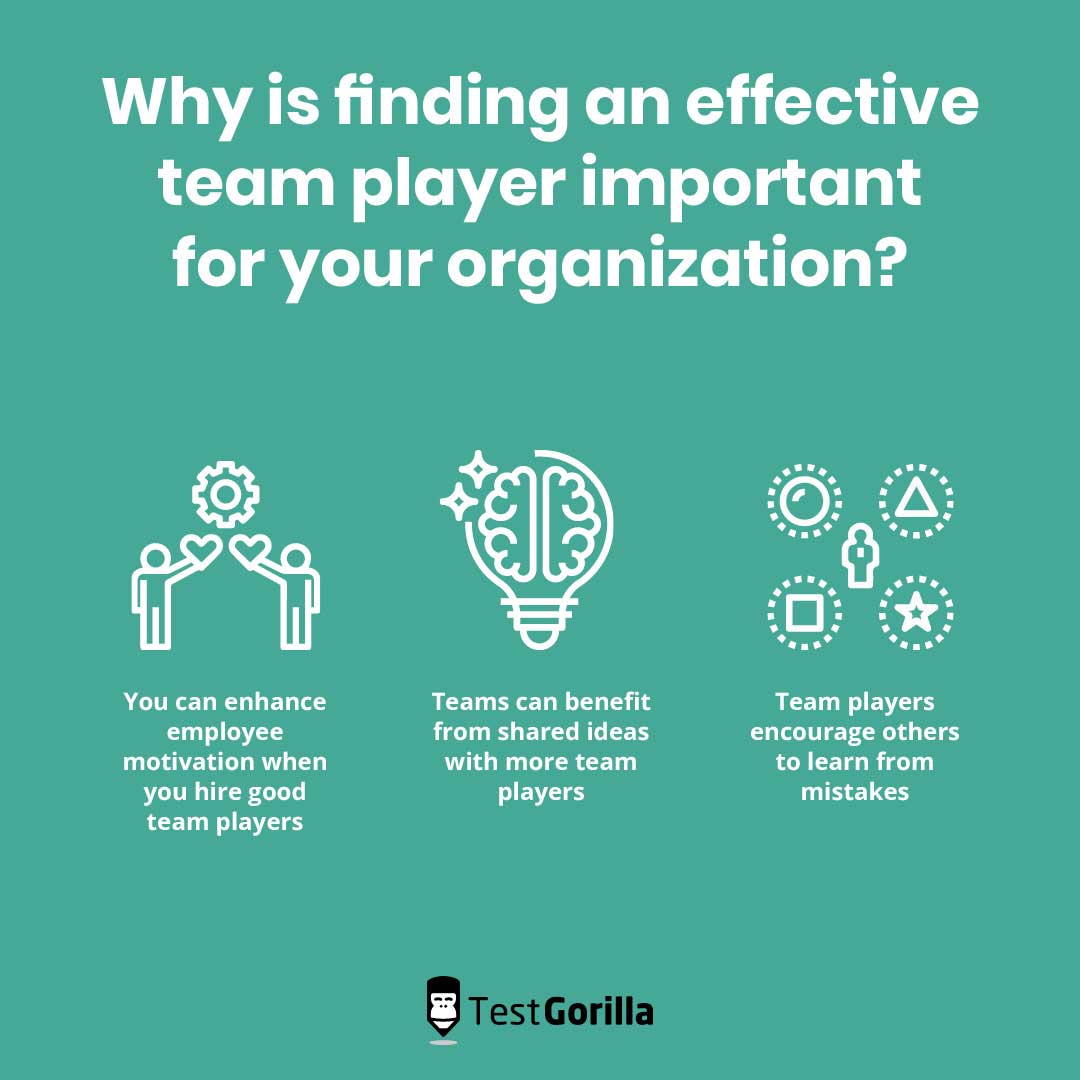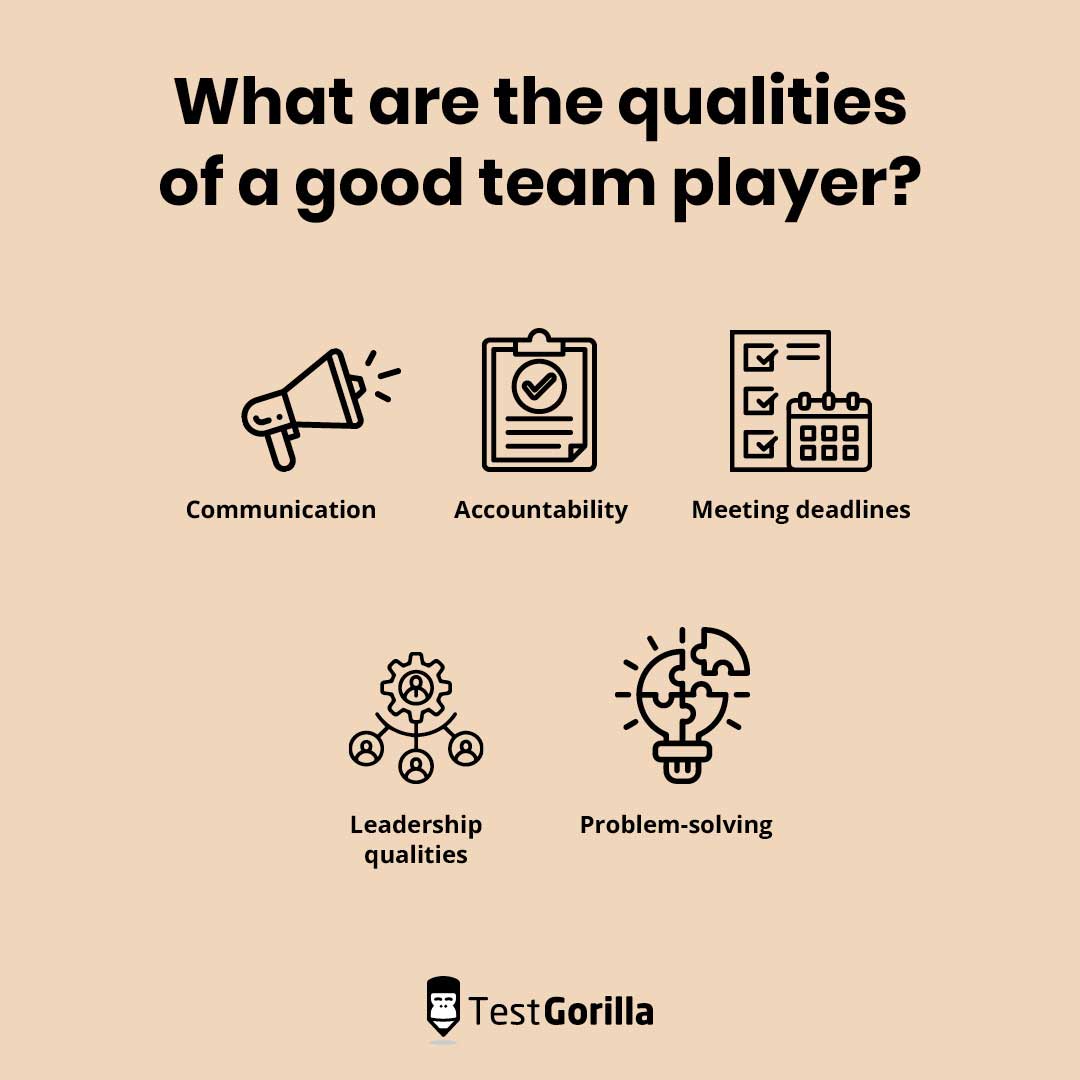5 qualities that make an employee a great team worker
Are you looking for a good team worker for your organization? Have you struggled to determine the team-player qualities you should be looking for during recruitment? And are you looking for an up-to-date definition of a team player in the workplace?
At TestGorilla, we know that having team players in your organization is critical.
With that in mind, we’ve put together this article so you can discover the best team-player qualities and find out the answers to the above questions – so read on.
Table of contents
- What does being an effective team player mean in the workplace?
- Why is finding an effective team player important for your organization?
- What are the qualities of a good team player?
- How can you determine whether a candidate is a good team player?
- Review if your existing employees are effective team players with skills assessments
What does being an effective team player mean in the workplace?
When we use the phrase “good team worker” or “effective team player,” we refer to those who proactively participate in team activities and tasks to meet challenging goals at work.
You’ll know if you’re interviewing or reviewing an effective team player if they can demonstrate active listening skills to enhance productivity and can work with the wider organization to manage projects or assist their team.
Why is finding an effective team player important for your organization?
There are many benefits good teamwork can bring to your organization. Here are the three main reasons why you should prioritize team players for your business.
1. You can enhance employee motivation when you hire good team players
With good team workers on your team, your employees will feel supported. Team players enhance other team members’ loyalty, leading to increased motivation and unity. This motivation can inspire your team to work toward a unified goal and meet targets.
Further reading: How to hire team players
2. Teams can benefit from shared ideas with more team players
Teamwork relies on members who feel like they can speak openly. And the effect works the other way around, too: Team members feeling they can speak openly is the result of having team players and efficient teamwork in your organization.
The more team players you have in your organization, the more cognitively diverse contributions you will notice, leading to practical problem-solving, greater innovation, and smarter solutions to challenging problems.
3. Team players encourage others to learn from mistakes
With active team players on your side, your team is likely to notice any errors or issues that arise, thanks to increased communication, feedback, and co-worker reviews.
For instance, when a team player notices they’ve made an error, they will actively seek ways to share the mistake as a learning opportunity for the rest of their team. These learning opportunities can work toward helping the team minimize future mistakes and increase the quality of their work.
The best insights on HR and recruitment, delivered to your inbox.
Biweekly updates. No spam. Unsubscribe any time.
What are the qualities of a good team player?
Having explored the benefits of having a good team worker, here are the qualities of a good team player you should look out for when interviewing and skill-testing candidates.
Communication is critical for good team workers
When interviewing applicants, look for signs that they understand the importance of effective communication. Good team workers will know that collaboration is vital and can help a team yield excellent results.
So do your candidates have the right active listening skills to collaborate effectively? And are they open to sharing ideas with the rest of their team?
Good team workers value accountability
Accountability is the second quality good team workers will value. This shows that your candidate or employee will take ownership of any errors they make rather than passing the buck. With accountability comes team loyalty, team respect, and increased productivity and motivation.
Meeting deadlines is a critical skill for top team players
Excellent time management and the ability to meet deadlines are characteristics of good team workers. An effective team player will know that meeting deadlines can facilitate other workers’ jobs. It’s important to consider whether your candidates or employees have the right time-management skills to meet deadlines and streamline the workflow for all employees.
Having some leadership qualities is important
Your new hire might not be going into a leadership role, but leadership skills can certainly help employees work in a team. This is all about knowing when to reach out to other team members and keeping their doors open to assist them when needed.
Can your new hire intuitively use leadership skills to share their senior-level experience with their team? Are they reachable when other team members need their support.
Solving problems comes naturally to good team players
One of the critical qualities of good team workers is problem-solving skills. When team members encounter problems, who are they going to call? They’ll reach out to approachable team players who can use their critical thinking and problem-solving abilities.
How creative are your candidates’ and employees’ solutions to complex problems? Do your employees have effective methods to solve challenging problems?
How can you determine whether a candidate is a good team player?
The best way to determine whether a candidate is an effective team player is to use skills testing. Using the right combination of skills tests, you can assess the essential team-player qualities you expect from your candidates.
Some of the skills tests you may consider include:
Communication skills test – use this to assess your candidates’ active listening, written, and verbal communication, so you can learn whether they are good team workers and collaborators.
Time Management skills test – this test will review applicants’ abilities to organize their time effectively and meet deadlines. Learn if they can support their team’s productivity goals with these skills.
Critical Thinking test – it’s important to determine whether your candidates understand the relationship between cause and effect and can support their teams when solving challenging problems.
Problem Solving test – assess your applicants’ decision-making and analytical skills. Also find out if they can solve complex challenges and help a team solve problems with the best solutions.
Leadership and People Management skills test – use this test to review your candidates’ abilities to influence, assist, and guide team members as a top team player does.
Review if your existing employees are effective team players with skills assessments
Hiring top team players is paramount for meeting your business’s targets. You can find the most effective team players for your organization with skills tests and assessments.
Visit our skills test library to check out the full range of tests to assess candidates for the qualities of a good team player you’re looking for and hire team players for your organization the easy way. Register for free today.
You've scrolled this far
Why not try TestGorilla for free, and see what happens when you put skills first.
















